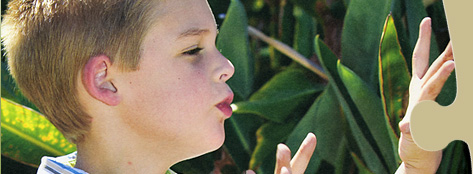
Stay Informed
Request Free Information
Receive Outreach Magazine
and other helpful information

Research & Medical Affairs
Discover our various sources of informationResearch FAQ
- What does my participation involve?
- Will our child's or family's information be kept confidential?
- Who is paying for this research?
- What blood test results can my family expect from SARRC?
- What clinical information can my family expect from SARRC?
- Is SARRC actually doing genetic research?
- How are DNA samples made available to qualified researchers?
- Where will the DNA samples be stored?
- Who provides scientific oversight for SARRC research projects?
- What does my participation involve?
This varies depending upon each individual research project. Clinical trials usually require a weekly or bi-weekly visit to SARRC. Genetic studies may require families to complete a series of assessments, including diagnostic assessments, medical evaluations and a family blood draw. Diagnostic evaluations will be performed with one parent and each affected child over the course of two clinic visits. A pediatric geneticist and developmental pediatrician will perform medical examinations of the affected children before blood is drawn on all family members on a third clinic visit. Additional assessments may be completed over the telephone. The duration of each visit will vary from family to family. - Will our child's or family's information be kept confidential?
Yes. All data and blood collected by SARRC are kept strictly confidential and coded with a confidential ID number to protect your family's identity. No family contact information will be shared with anyone outside of SARRC without your permission. - Who is paying for this research?
SARRC receives funding from research study sponsors, collaborating research institutions, grants and private donors. There is no cost to your family to participate. - What blood test results can my family expect from SARRC?
For families participating in the Autism Genetic Resource Exchange (AGRE) study, blood samples from one affected child are sent to an outside laboratory for Fragile X testing and karotyping (chromosomal analysis). Although lab results are not routinely sent to families, you may request to be informed of any "positive" lab results (i.e., evidence of Fragile X syndrome or a chromosomal abnormality). SARRC staff members are not allowed to discuss the results of these medical tests with you directly, but will arrange for your family physician or genetic counselor to convey these results to you. We do not report results from other studies requiring blood draws. However, for the clinical trials looking at the efficacy of novel treatments for autism, you can request lab results that would include routine blood and urine results. - What clinical information can my family expect from SARRC?
Families participating in the Autism Genetic Resource Exchange (AGRE) study will receive a letter from AGRE summarizing the results of the affected children's diagnostic evaluations. - Is SARRC actually doing genetic research?
Diagnostic assessments are entered into SARRC's database to identify statistically significant social, behavioral, developmental, language, cognitive and clinical findings that characterize different autism phenotypic subsets. Experienced researchers at the Translational Genomics Research Institute (TGen) analyze the genetic materials provided through the collaboration.
The Autism Genetic Resource Exchange (AGRE) is an open resource repository that provides DNA samples and clinical data to qualified researchers around the world. Any qualified researcher whose focus is autism research is eligible to utilize the specimens that have been collected as part of this collaborative research project. The AGRE Researcher Review Committee must approve all researcher applications. - How are DNA samples made available to qualified researchers?
Specimens collected as part of the Autism Genetic Resource Exchange (AGRE) study are immortalized. The process of immortalizing cell lines is a laboratory technique that allows white blood cells to reproduce indefinitely, thereby allowing an unlimited supply of cell lines and DNA to autism researchers. Once immortalized, the samples are stored and ready for distribution. - Where will the DNA samples be stored?
The blood specimens for the Autism Genetic Resource Exchange (AGRE) study are stored at Rutgers University Cell Line and DNA Repository in New Jersey. It takes approximately three to four months for the cell lines to be immortalized and prepared for distribution. DNA samples may also be stored at the Translational Genomics Research Institute in Phoenix, Arizona. - Who provides scientific oversight for SARRC research projects?
SARRC has a Research and Medical Affairs Committee that includes experts in genetics and neurodevelopmental disorders who provide scientific direction for SARRC.